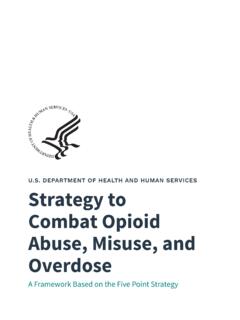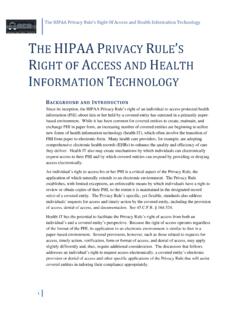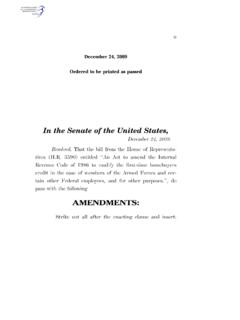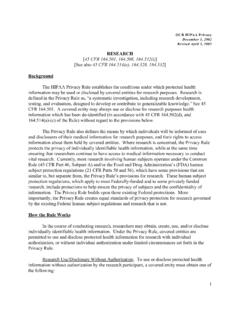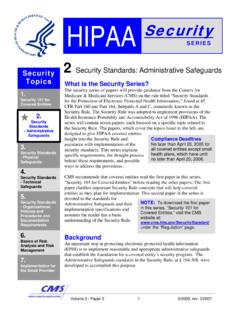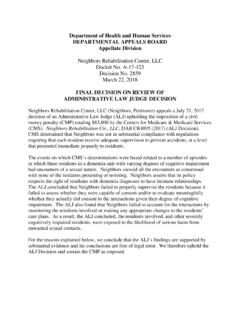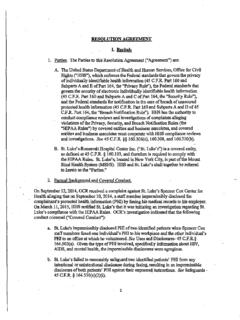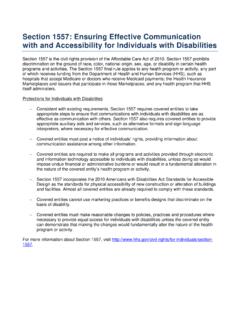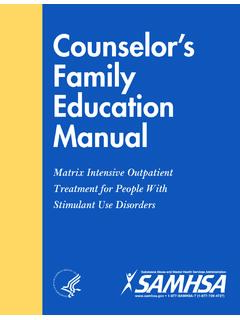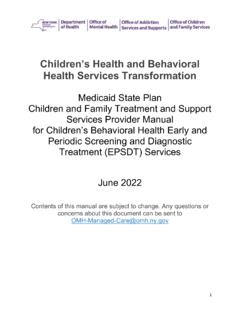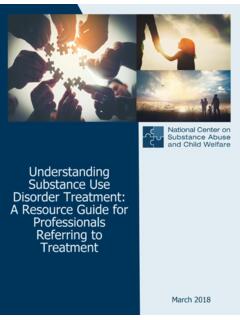Transcription of Additional FAQs on Sharing Information Related to ...
1 Additional FAQs on Sharing Information Related to treatment for Mental health or substance Use Disorder including opioid abuse ADULT PATIENTS. Does having a health care power of attorney (POA) allow access to the patient's medical and mental health records under HIPAA? Generally, yes. If a health care power of attorney is currently in effect, the named person would be the patient's personal representative (The period of effectiveness may depend on the type of power of attorney: Some health care power of attorney documents are effective immediately, while others are only triggered if and when the patient lacks the capacity to make health care decisions and then cease to be effective if and when the patient regains such capacity). Personal representatives, as defined by HIPAA, are those persons who have authority, under applicable law, to make health care decisions for a patient.
2 HIPAA provides a personal representative of a patient with the same rights to access health Information as the patient, including the right to request a complete medical record containing mental health Information . The patient's right of access has some exceptions, which would also apply to a personal representative. For example, with respect to mental health Information , a psychotherapist's separate notes of counseling sessions, kept separately from the patient chart, are not included in the HIPAA right of access. Additionally, a provider may decide not to treat someone as the patient's personal representative if the provider believes that the patient has been or may be subject to violence, abuse , or neglect by the designated person or the patient may be endangered by treating such person as the personal representative, and the provider determines, in the exercise of professional judgment, that it is not in the best interests of the patient to treat the person as the personal representative.
3 See 45 CFR (g)(5). Does HIPAA permit health care providers to share protected health Information (PHI) about an individual who has mental illness with other health care providers who are treating the same individual for care coordination/continuity of care purposes? HIPAA permits health care providers to disclose to other health providers any protected health Information (PHI) contained in the medical record about an individual for treatment , case management, and coordination of care and, with few exceptions, treats mental health Information the same as other health Information . Some examples of the types of mental health Information that may be found in the medical record and are subject to the same HIPAA standards as other protected health Information include: medication prescription and monitoring counseling session start and stop times the modalities and frequencies of treatment furnished results of clinical tests 1.
4 Summaries of: diagnosis, functional status, treatment plan, symptoms, prognosis, and progress to date. HIPAA generally does not limit disclosures of PHI between health care providers for treatment , case management, and care coordination, except that covered entities must obtain individuals' authorization to disclose separately maintained psychotherapy session notes for such purposes. Covered entities should determine whether other rules, such as state law or professional practice standards place Additional limitations on disclosures of PHI Related to mental health . For more Information see: Does HIPAA provide extra protections for mental health Information compared with other health Information ? Does HIPAA permit health care providers to share protected health Information (PHI) about an individual with mental illness with a third party that is not a health care provider for case management or continuity of care purposes?
5 For example, can a health care provider refer a homeless patient to a social services agency, such as a housing provider, when doing so may reveal that the basis for eligibility is Related to mental health ? HIPAA, with few exceptions, treats all health Information , including mental health Information , the same. HIPAA. allows health care providers to disclose protected health Information (PHI), including mental health Information , to other public or private-sector entities providing social services (such as housing, income support, job training) in specified circumstances. For example: A health care provider may disclose a patient's PHI for treatment purposes without having to obtain the authorization of the individual. treatment includes the coordination or management of health care by a health care provider with a third party.
6 health care means care, services, or supplies Related to the health of an individual. Thus, health care providers who believe that disclosures to certain social service entities are a necessary component of, or may help further, the individual's health or mental health care may disclose the minimum necessary PHI to such entities without the individual's authorization. For example, a provider may disclose PHI about a patient needing mental health care supportive housing to a service agency that arranges such services for individuals. A covered entity may also disclose PHI to such entities pursuant to an authorization signed by the individual. HIPAA permits authorizations that refer to a class of persons who may receive or use the PHI. Thus, providers could in one authorization identify a broad range of social services entities that may receive the PHI if the individual agrees.
7 For example, an authorization could indicate that PHI will be disclosed to social services providers for purposes of supportive housing, public benefits, counseling, and job readiness.. EMERGENCIES, EMERGENCY HOSPITALIZATION OR DANGEROUS SITUATIONS. When does HIPAA allow a doctor to notify an individual's family , friends, or caregivers that a patient has overdosed, , because of opioid abuse ? As explained more thoroughly below, when a patient has overdosed, a health care professional, such as a doctor, generally may notify the patient's family , friends, or caregivers involved in the patient's health care or payment for care if: (1) the patient has the capacity to make health care decisions at the time of the disclosure, is given the opportunity to object, and does not object.
8 (2) the family , friends, or caregivers have been involved in the patient's health care or payment for care and there has been no objection from the patient;. 2. (3) the patient had the capacity to make health care decisions at the time the Information is shared and the doctor can reasonably infer, based on the exercise of professional judgment, that the patient would not object;. (4) the patient is incapacitated and the health care professional determines, based on the exercise of professional judgment, that notification and disclosure of PHI is in the patient's best interests;. (5) the patient is unavailable due to some emergency and the health care professional determines, based on the exercise of professional judgment, that notification and disclosure of PHI is in the patient's best interests; or (6) the notification is necessary to prevent a serious and imminent threat to the health or safety of the patient or others.
9 If the patient who has overdosed is incapacitated and unable to agree or object, a doctor may notify a family member, personal representative, or another person responsible for the individual's care of the patient's location, general condition, or death. See 45 CFR (b)(1)(ii). Similarly, HIPAA allows a doctor to share Additional Information with a patient's family member, friend, or caregiver as long as the Information shared is directly Related to the person's involvement in the patient's health care or payment for care. 45 CFR. (b)(1)(i). Decision-making incapacity may be temporary or long-term. If a patient who has overdosed regains decision-making capacity, health providers must offer the patient the opportunity to agree or object to Sharing their health Information with involved family , friends, or caregivers before making any further disclosures.
10 If a patient becomes unavailable due to some emergency, a health care professional may determine, based on the exercise of professional judgment, that notification and disclosure of PHI to someone previously involved in their care is in the patient's best interests. For example, if a patient who is addicted to opioids misses important medical appointments without any explanation, a primary health care provider at a general practice may believe that there is an emergency Related to the opioid addiction and under the circumstances, may use professional judgment to determine that it is in the patient's best interests to reach out to emergency contacts, such as parents or family , and inform them of the situation. See 45 CFR (b)(3). If the patient is deceased, a doctor may disclose Information Related to the family member's, friend's, or caregiver's involvement with the patient's care, unless doing so is inconsistent with any prior expressed preference of the patient that is known to the doctor.
